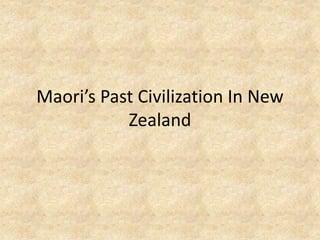
Maori Civilization and Treaty of Waitangi
- 1. Maori’s Past Civilization In New Zealand
- 2. Treaty Of Waitangi Peace and less conflict between the two We now have a government The land was sold in an organised way We are now protected by the Queen Without the T.O.W the French would of invaded Now all of the Maori’s have all of the same rights as everyone else Cause & Effect
- 3. How have the Maori and Europeans changed from past to now ? Do you think it was fair ? From 1790’s onwards there were settlements from lots of Europeans. It was very fair for the Maoris to have to learn the European ways. If the Maori hadn’t learnt How to be more European the treaty probably wouldn’t have been signed. At first the Europeans and Maoris fought a lot and mini wars were started. The Europeans brought terrible diseases when they came which is why the Maori population started decreasing Before the Europeans arrived in New Zealand, Maori lived in pas according to their iwi or tribal groups. They mostly lived around harbours close to the sea and they lived primarily off seafood, shellfish and the crops that they grew. When the Europeans arrived, the Maori way of life began to change. The Europeans brought guns, money, other types of food and unfortunately diseases. So the Maori now had much more destructive ways of fighting each other. Inter-tribal warfare resulted in far more deaths because now the Maori were using guns instead of traditional weapons. Slowly but surely both Maori and Europeans moved from a system of exchange and barter to a money based system using coins. They began to work for wages instead of just for goods and services. As well as this their diets changed. The Maori people started eating more bread and pastry based foods and the beginning of refrigeration led to more dairy products such as butter and cheese. European diets changed too, eating food like kumara (sweet potato), fish and shellfish like cockles and pipis. But unfortunately both races also suffered from diseases and illnesses. The Europeans imported some very bad bugs, including typhoid, measles and tuberculosis, for which there were no cures and many people died. Good things also happened as a result of the meeting of these two races. Education increased. Medical care increased and the number of babies and mothers dying in child birth began to decrease. European settlers learnt new things from the Maori, such as working with the natural environment and cultural forms of music and art. There was also a fair amount of inter-marriage so that over time, Maori and Europeans became one people. In summary Maori and Europeans have changed alot, in both good and bad ways but mostly for
- 5. How do the past events effect the way our life’s are today ? Why did we need a treaty ? The country now has its own strong sense of identity. It was to organise a treaty and unite Maori chiefs to accept British sovereignty over all the country. The Maori realised that the land was also sold in an disorganised way. We now live in a bicultural society. We regonise two languages which are Te- Reo and English. It established British law in New Zealand, while at the same time guaranteeing Maori authority over their land and culture.
- 6. How have the Maori had to adapt to European ways ? A dramatic change to the traditional Maori way of life/their lifestyle Maori women and children were more likely to experience domestic violence than any other ethnic group Making the two races into one strong community Accept the different cultures and tribes and the way people organised their own tribes.
- 7. Timeline 1300 AD The start of the continuous Polynesian settlement. These people, and many arrivals, were the ancestors of present- day Māori. 1350-Supposed year of ‘The Great Migration’ In which a large fleet Maori arrived in New Zealand from Hawaiki. 1806-First European women arrive in New Zealand. 1790-Deep sea whaling, sealing, flax and timber trades commence. The Māori suffer the first serious introduced epidemic. 1860-The Treaty Of Waitangi was signed on February the 6th 1843- The ‘Wairau Affect’. Violent confrontation between Europeans and the Maori. 1853-Tamihana Te Rauparaha and Matane Te Whiwhi propose the idea of a Maori King. 1840-1845-The Maori rebel against the British, lead by Hone Heke. 1857-Potatau 1 becomes the first Maori king. 1860-Second of the Maori wars fought at Waireki. 1863-More gold was discovered in Central Otago.
- 8. Bibliography www.nzhistory.net.nz www.history-nz.org www.timelines.ws www.treatyofwaitangi.net.nz www.wikipedia.org/wiki/TreatyOfWaitangi www.newzealand.com/travel/history-treaty-of-waitangi http://www.stuff.co.nz/taranaki-daily-news/life-style/4004019/Maori-adapt-to- change http://homepages.paradise.net.nz/nzealand/history.html The Way We Were Hauraki Gulf Kristen Warner Hodder Moa Beckrett
- 9. Thank you for watching our presentation we hope that you learnt lots :))…xx